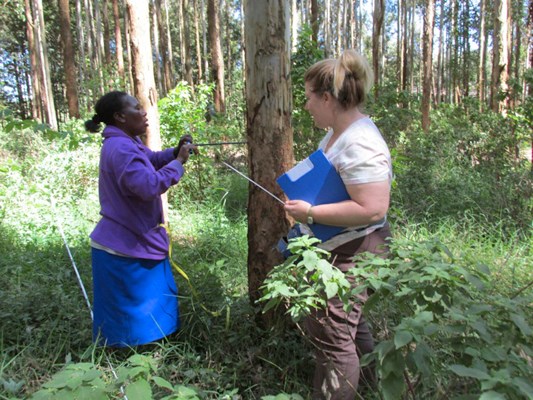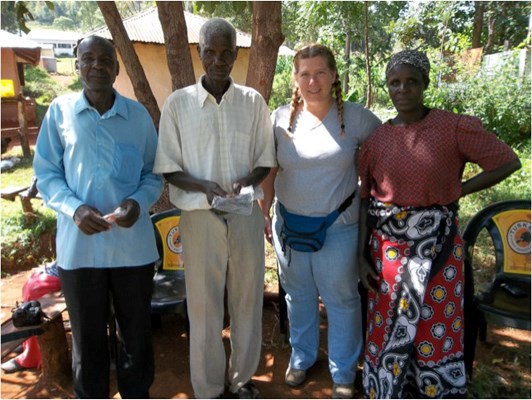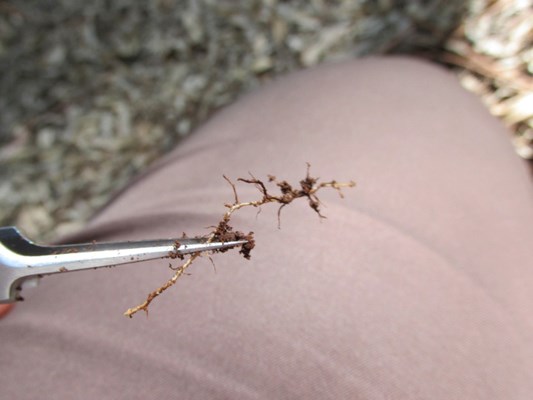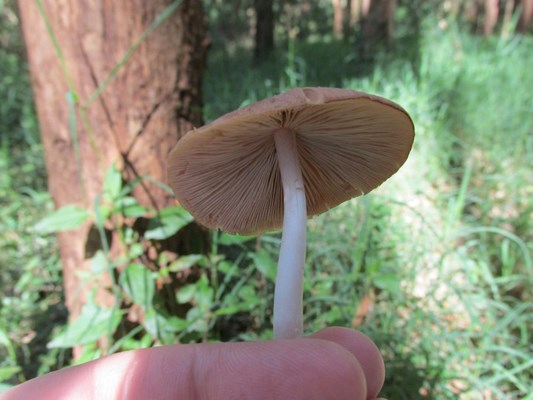Doctoral Student Studies Impact of Eucalyptus Trees in Kenya
FAYETTEVILLE, Ark. – It started with a railroad.
In 1896, the British government began construction in east Africa on what is now known as the Kenya-Uganda Railway. But the railroad construction and other building needs were depleting Kenya’s indigenous forests, and importing lumber from Europe was costly, so the British introduced the fast-growing eucalyptus tree to Kenya to meet their needs.
The trees spread across the Kenyan countryside and today eucalyptus forests cover nearly 250,000 acres in Kenya. The trees are grown primarily for construction materials, utility poles and the production of tea leaves.
Brandy Garrett Kluthe, a graduate student at the University of Arkansas who is studying the ecology of the eucalyptus in Kenya, seeks to find out how the introduction of the tree altered the Kenyan landscape.
“The eucalyptus tree is very important to the Kenyan economy,” Kluthe said. “Thousands of acres of eucalyptus are harvested and used as the fuel source to dry commercial tea leaves. These trees are grown on massive commercial farms as well as very small individual farms, most of which are one to two acres. Nearly every small plot farmer I met was growing eucalyptus. In just more than 100 years the introduction of this tree has completely changed the landscape and the economy of this country.”
Still, the effect of the eucalyptus in Kenya hadn’t been comprehensively investigated until Kluthe, a doctoral student in environmental dynamics, took it on as her dissertation topic. She traveled to Kenya in the spring of 2013 and earlier this year to conduct research, including partnering with the Kenya Forestry Research Institute and the National Museums of Kenya.
Environmental dynamics is the study of complex interactions between natural systems and human activity. It requires an interdisciplinary research approach and integration with the power, efficiency and economy of advanced geospatial computing technologies.
The doctoral program at the U of A is unique because of its focus on interdisciplinary environmental-sociocultural study integrating state-of-the-art technologies to chart interactions of human and natural systems over time and space.
“I am looking at many different components that could be affected by eucalyptus, such as soil nutrient use, how it competes with native species or how it is using water resources,” Kluthe said. “There is also a human element. In areas suitable for eucalyptus, most farmers in Kenya will plant it because it is a valuable income source. After 10 to 15 years the trees will be harvested and the money can be used to pay for their children to go to secondary schools or universities. This has allowed subsistence farmers to plan for the future needs of their children.
“I also want to understand how this species has done so well there,” she said. “In order for the eucalyptus to thrive they need to form a symbiotic relationship with a soil fungus. The fungi attach to the outside of the eucalyptus root. The trees provide sugars to the fungi and in return the fungi help the trees absorb minerals from the soil. Very little is published about the mycorrhizal fungi of eucalyptus in Kenya, so there is potential of finding novel fungi species.”
Kluthe is attending the U of A on a Doctoral Academy Fellowship, which was created in 2002 as part of a $100 million endowment established by a $300 million gift from the Walton Family Charitable Support Foundation.
Topics
Contacts
Chris Branam, research communications writer/editor
University Relations
479-575-4737,
cwbranam@uark.edu
Headlines
Four Students Named Goldwater Scholars; Two Earn Udall Honorable Mentions
Four U of A students have received the prestigious Goldwater Scholarship, an award for top students in mathematics, science, and engineering.
Cross-Campus Collaboration Culminates in New Outdoor Geological Installation
Grand opening event to celebrate the new GeoLab installation at the U of A’s Gearhart Hall courtyard is set for May 3. The installation will be open to the public year-round.
First Students to Use Online Degree to Hone Nursing Leadership, Elevate Patient Care
Hanna Baxendale and Wendi Kimbrell will begin coursework in the Doctor of Nursing Practice-Executive Master of Business Administration program offered by the Eleanor Mann School of Nursing and Walton College.
Join the Office for Sustainability on a Final Cruise to Campus
Cruise to Campus Wednesdays have fostered a gathering space for individuals interested in biking to campus. Drop by the Old Main Lawn from 7:30-10 a.m. Wednesday for coffee, something to eat and conversation.
Fay Jones School Student Ambassador Program Gives Voice to Design Students
The student ambassador program at the Fay Jones School of Architecture and Design is built to connect top design students with their school, its alumni, its future students and others inside and outside the school.









